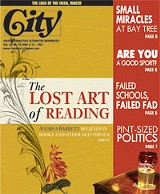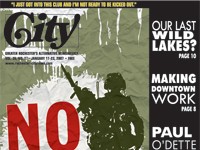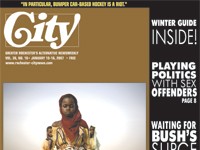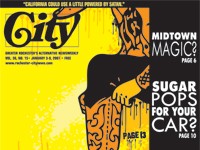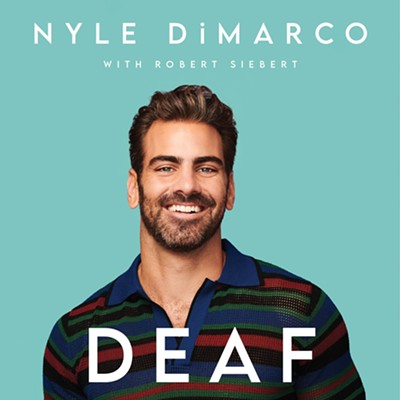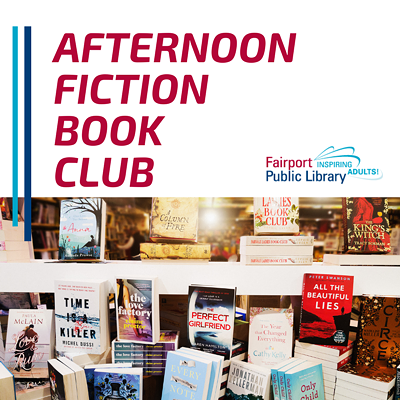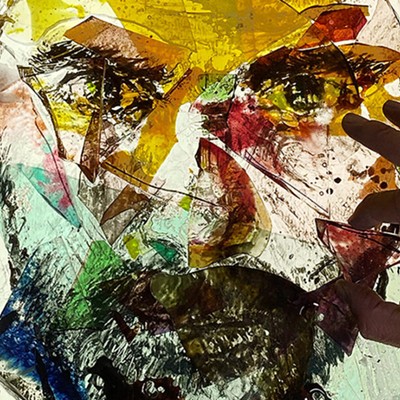The lost art of reading
Andrea Barrett believes in the power of books and other old things
By Erica Curtis[
{
"name": "500x250 Ad",
"insertPoint": "5",
"component": "15667920",
"parentWrapperClass": "",
"requiredCountToDisplay": "1"
}
]
Novelist and former Rochesterian Andrea Barrett, for a little light winter reading, is working her way through the collected works of the Brontë sisters. It's an exercise she calls "a perverse but very yummy thing."
The thoroughness is characteristic. Take, for example, the intricate family tree she drew for her characters. The casual reader may not guess that the characters in Barrett's Servants of the Map, chosen for this year's If All of Rochester Read the Same Book program, are all related to each other. Some are even related to characters in other stories. To keep it all straight, Barrett had to start mapping the links on a piece of construction paper.
"People read the stories and it looks OK to them," she says, "but a few people to whom I've shown the chart, there's always a moment when you realize, 'Oh, that look on that person's face, is it that they think I'm crazy?' They're trying to be polite but they don't know quite what to say for a second. It's that moment when you realize you're just a little more obsessional than you would like."
It may be the trappings of a scientifically trained mind. Reviewers and interviewers return again and again to Barrett's fascination with science. The question first came up when her book Ship Fever won the 1996 National Book Award. Suddenly people were taking notice of this unassuming writer who mixed literature and science. They asked her why so many of her characters are scientists and why she cares so much about scientific research when she's in the business of writing novels.
But to her, it's really kind of simple. She has an undergraduate degree in biology, loves to read about science, and finds scientific research and scientists themselves natural sources of stories.
"I also think the more I've written about science and scientists over time, the richer the field has become for me metaphorically," she says. "Maybe any field is like this when you explore it with enough depth, but it comes to seem as if it stands for everything else in some way."
The metaphors are there, and they're rich. Her scientists are haunted by their quests. Their research embodies their longing, their failures, and their loves.
And through the characters' and the author's interest, the reader becomes interested. The words dwell lovingly on tools and books and research questions. And before they know it, self-professed literature nerds are enjoying a story about fossils or biochemistry.
It's not that weird, Barrett says. Science and literature aren't mutually exclusive.
"I think the easy answer is it's people still sort of holding to that very old-fashioned two-cultures model," she says, "still reflexively thinking, 'Oh, writers are basically English majors and English majors are goofy humanists and they don't know any math or science.'"
But there is another preconception she's breaking apart.
"There are some younger men now who are writing about scientists quite well, and one of them at least is a scientist, a physicist," she says. "I notice when people interview him or write about his work, nobody seems startled that he writes about science. But that's because he's a boy and he's at MIT."
You could say that Barrett is an old soul. There's the statement she once made in an interview that she should have been born in another century, so she could have been "Darwin in a skirt."
And then there's the fact that while writing of the instant variety is distracting the popular eye, Barrett continues to quietly and methodically delve into the research for her stories. She pores over old books with their funny illustrations (items she says are "disgustingly irresistible"), pins up old photographs to inspire her as she works, and wades through libraries. She turns down writing assignments that require quick turnarounds. She can't work that way, she says.
The same old flavor is in her writing. Her stories are full of characters from the past that obsess over scientific discoveries long outdated and suffer from illnesses since cured; they travel by ship and by train. And her words resonate with an authority usually reserved for ancient things.
As long as that authority and power continue to find their way from her mind to the page, Barrett will earn fame among readers of literary fiction. And local fans will continue to brag about her ties to Rochester.
We brag as we've brushed elbows with someone famous, even though the idea of a celebrity novelist is becoming an old-fashioned notion. Writers who put out "challenging" books aren't always found on bestseller lists. And for every person who thrills to know that until recently a National Book Award winner walked her dogs down Berkeley Street and did her research in the Central Library, there are probably a dozen who couldn't care less.
When you think about Barrett's own love of books and the significance that books have in her stories --- you think of Max, the hero of the title story in Servants of the Map,dragging a box of books through the Himalayas --- you have to wonder if the only ones who can appreciate her zeal are already sitting in the choir. Are the only people reading books about "the universe's deepest mysteries" (as the Washington Post said) a shrinking circle of bookworms?
Barrett, perhaps obviously, likes to believe in the power of the written word.
"It may be naïve of me and may be optimistic, but I always do feel that some people are [reading] with just the same passion, always," she says. "Maybe those people are more hidden now, or maybe their numbers are smaller.... I still find people love books with exactly the same intensity that I did as a little girl and a young woman and do now. I find that in all kinds of places and among people of all ages and classes. It's just not everybody."
Some of those people are at Writers & Books. Those folks made Servants of the Map the choice for this year's If All of Rochester program. And the choice could have an impact on pop culture, at least locally. The W&B study guide says that 60,000 to 90,000 people have participated over the program's previous four years.
"I had to sit down when I saw that," Barrett says. "Somehow I thought it would be more like 6,000, which is significant enough."
Barrett wasn't exactly a looming presence on Rochester's literary scene while she lived here. She was here for 20 years, until June of last year, through the writing of just about all of her books. But she kept to herself.
"When I was home in Rochester, I wanted to just be home and not be teaching," she says, "and have that be a place where I could be myself and have my private life."
She didn't give a lot of readings, sit at many book signings, or give many lectures. Instead of teaching locally, Barrett joined the faculty at Warren Wilson College in North Carolina and Bread Loaf in Vermont --- small, nontraditional programs that carry prestige in the writing community but usually draw blank faces elsewhere.
What she took from Rochester was more personal.
"I know Rochester's not swarming with writers, in the way that a place like Seattle or Boston is," she says, "but for me it was enough to nourish and not enough to swamp. It was a very good place for me to write." She was part of a small writers' group that she says was "just everything for a bunch of years," and that read all the drafts of her first two novels.
It was a fitting way for her to proceed in her writing career, as quietly and as solidly as she had slipped in to it. With an undergraduate degree in biology and graduate coursework in both zoology and history started and then abandoned, Barrett was in her late 20s before she started writing.
"A moment I remember as being some sort of signal had I been smart enough to pay attention was: I was supposed to be writing a term paper for a graduate class in medieval history on the Inquisition and I was instead writing a little play and quite enjoying myself and writing all this dialogue, and also in the back of my mind realizing my teacher was just not going to be in love with this as an academic exercise."
When she went to the 10-day Bread Loaf writing conference at Middlebury College in Vermont, it was the first writing class she had ever taken.
"I went as a 30-year-old with a novel in my purse, knowing nothing," she says.
Now, her scientific curiosity and ability to self-educate has gotten her to a place where she can write books that she loves and that many people love to read. It's a happy situation, and not one of the much-publicized suffering artist. She works hard, reaps the benefits, and seems content.
"If I had my druthers I would never do anything else," she says.
She hopes the If All of Rochester program will inspire more people to open books. "I don't know how to word this," she says. "I imagine some people reading [Servants of the Map] are reading it under something like duress. Some are given it as an assignment, yes? But if it would make them excited about reading, I would be so happy."
Her love of books is infectious. You can't help it. There are the school-children's primers that pop up in Servants: terse, question-and-answer, catechism-style books that frustrate the characters charged with teaching and writing them. Is she fascinated by these, too?
"Oh, I wish I could show you one. I do physically have all sorts of old crumbly things but among them that particular book that shows up in Theories of Rain," she says.
"You have to go look at one someday," she says. "They're so delectable to look at. They have wonderful drawings and sometimes little maps. You would be fascinated."
Somehow when she says it, Andrea Barrett makes it so.
Join the book club
For the last five Januarys, Writers & Books has announced its pick for If All of Rochester Read the Same Book. And when the title hits the streets, people throughout the community start reading and discussing, readying themselves for the author's visit in March.
W&B executive director Joe Flaherty estimates that between 15,000 and 20,000 people participate in the program each year. It involves people in high-school classes, community book clubs, and senior living centers. An average of 3,000 people attend the events during the writer's three-day residency, a period packed full of readings, discussions, and master classes.
In 2000, Rochester became the third city in the US to start a community-reading program, though now "literally hundreds and hundreds of cities across the country are doing the program in some form or another," says Flaherty.
It's part of an initiative to bring people back to books. "The studies do show that over the past, say, 20 or 30 years, the level of reading of what we call literary books has fallen, actually," Flaherty says. "It is something that is a worrisome trend. An effort like this really does call attention to reading and how it can be an enjoyable experience."
When choosing a book, Writers & Books wants a good read, a book that will appeal to a wide audience, and a book that will stand up to two months of discussion in classrooms and library community rooms, something with "some meat on the bones."
Servants of the Map offers a bonus. Because it is a collection of stories, W&B folks hopes it might draw attention to the short story, fiction's "forgotten stepchild."
Andrea Barrett will be in Rochester Thursday, March 17, through Saturday, March 19. She will be at the following events:
Thursday, March 17: Reading, St. John Fisher College, 3690 East Avenue, 7 p.m.
Friday, March 18: On-stage interview, Monroe Community College, 1000 East Henrietta Road, 12 p.m.
Reception with W&B members, Rochester Academy of Medicine, 1441 East Avenue, 6:30 p.m., $15.
Lecture, Rochester Academy of Medicine, 1441 East Avenue, 8 p.m. $10.
Sat, March 19: Master class, Writers & Books, 740 University Avenue, 11 a.m. $55.
Events are free unless otherwise noted. Call 473-2590 or visit www.wab.org for more information.
Latest in Featured story
More by Erica Curtis
-
What's in the water?
Jun 14, 2006 -

Roses are red
May 3, 2006 -

As American as pasta e fagiole
Mar 22, 2006 - More »
